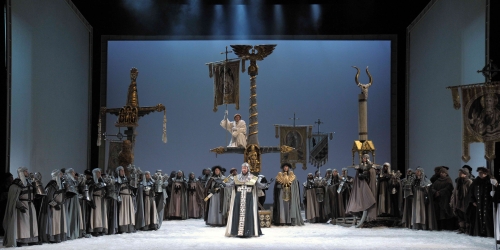Other Links
Editorial Board
- UK Editors
- Roger Jones and John Quinn
Editors for The Americas - Bruce Hodges and Jonathan Spencer Jones
European Editors - Bettina Mara and Jens F Laurson
Consulting Editor - Bill Kenny
Assistant Webmaster -Stan Metzger
Founder - Len Mullenger
Google Site Search
SEEN AND HEARD
INTERNATIONAL OPERA REVIEW
Wagner, Lohengrin: Soloists,
Chorus and Orchestra of Lyric Opera of Chicago, Sir Andrew Davis,
(conductor), Civic Opera House, Chicago, 5.3.2011 (JLZ).
Set and Costume Designer: John Napier
Lighting Designer: Christine Binder
Stage Director: Elijah Moshinsky
Chorus Master: Donald Nally
Conductor: Sir Andrew Davis
Cast:
The Herald: Lester Lynch
Friedrich, Count of Telramund: Greer Grimsley
King Heinrich: Georg Zeppenfeld
Elsa of Brabant: Amber Wagner
Lohengrin: Johan Botha
Ortrud: Michaela Schuster

Picture
© Dan Rest
After a long absence from Lyric Opera of Chicago's repertoire,
Richard Wagner's Lohengrin made
a welcome return in a production from the Royal Opera House, Covent
Garden. The international cast included the stellar tenor Johan
Botha in the title role, and the last performances of the season
featured the role debut of the young soprano Amber Wagner. The
chemistry between the two singers was evident aurally, with both
performers giving impeccable readings of their parts under the
direction of Sir Andrew Davis.
The familiar story is of the rescue of Elsa of Brabant by the
Grail knight Lohengrin, whose identity must be withheld. Yet in
defeating Friedrich of Telramund, who falsely accuses Elsa,
Lohengrin's decision to grant repentance only opens the door for
more deception as Telramund and Ortrud scheme to regain power by
sowing doubts in Elsa about the nature of her savior. Elsa succumbs
to the intrigue by asking the knight his name. Lohengrin then
discloses his identity and explains the machinations behind the
politics of Brabant. Yet he also restores to Brabant its young
leader, Gottfried, whom everyone had presumed dead-and the
miraculous restoration leaves Elsa in a faint at the end of the
opera.
As Elsa, Ms. Wagner commands the role with technical assurance,
vibrant tone and subtle use of dynamics, setting her apart from
others who do not always bring these qualities to bear. Her vocal
security includes the sometimes treacherous passages in her
character's ecstatic music at the end of the first act, and
continuing in the aria "Euch Lüften" in the opening of the second.
Also in the second act, Ms. Wagner gives an equally strong reading
of the duet with Ortrud, and is even more impressive in her
third-act duet with Lohengrin, "Das süsse Lied." Never strident and
always at ease, this portrayal of Elsa was notable for its powerful
vocal characterization.
Botha's Lohengrin is equally impressive. The tenor offers a fresh
and resilient tone to music that defines the nature of a
Heldentenor, and his phrasing is remarkable, as well, given the
demanding range of the part. More than that, Botha's ease of
execution only adds to a memorable Lohengrin that should remain a
standard for years to come.
In addition Georg Zeppenfeld offered a powerful King Heinrich
through his resonant bass and lyrical line. As declamatory as some
passages may be, Zeppenfeld continually maintained a keen focus,
totally commanding the stage with his rich tone and precise diction.
As the scheming Ortrud, Michaela Schuster was effective but
sometimes strained. But her interpretation of the second-act
soliloquy "Entweihte Götter!" was sensitive to the text, creating a
sense of foreboding. Her partner Greer Grimsley was similarly
persuasive as Telramund. Both Schuster and Grimsley worked hard to
give their characters depth, all the way through to the final
revelations.
The entire score flowed masterfully under the direction of Sir
Andrew, whose first act was very much on point, keeping the drama
flowing. The more introspective second act was nicely balanced in
the smaller scenes, culminating in Elsa's procession to the
cathedral. Davis nicely balanced the moment of triumph while
retaining the shadow only Ortrud can bring. In the final act, the
familiar wedding march received a satisfying if brisk reading, with
the duet between Elsa and Lohengrin balanced nicely with Lohengrin's
monologue "In fernem Land"-the pacing was musically and dramatically
persuasive. This was one of Davis's finest performances, and
confirms the conducting strength he brings to Lyric. Yet the evening
belonged to Ms. Wagner, whose outstanding depiction of a challenging
heroine was one that will be recalled for years.
James L. Zychowicz
